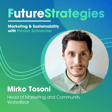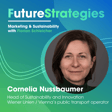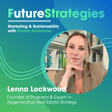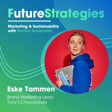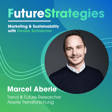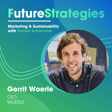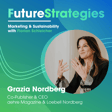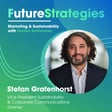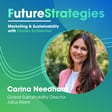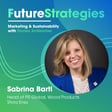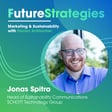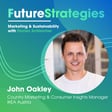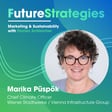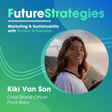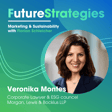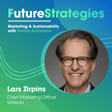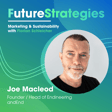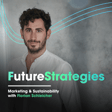Should environmental action be economically beneficial?
00:00:00
Speaker
what is more important to do something good for the environment or to save money and in our company it's very clear that we are doing something good for the environment but there's always for me there are two rules environmental action always also has to be economically beneficial and the second rule would be that consumers should not waive or relinquish any benefits of the products.
Introduction and sustainable marketing focus
00:00:25
Speaker
Welcome to Future Strategies. I'm your host, Florian Schleicher. And this show is my gift to you. In honest conversations with inspiring marketing leaders, we explore how marketing and strategies can achieve sustainable growth.
00:00:44
Speaker
If you would like to apply this to your own projects, that's exactly what I do as a strategist, coach and workshop facilitator. I'm here to help you build the marketing of your futures. So let's jump right into it.
Meet Florian Iro and Erdle's eco-friendly mission
00:01:03
Speaker
Today, my guest is Florian Iro. He is the CEO of Erdle, a family-run manufacturer of cleaning and care agents with its headquarters in Germany. Their highest selling brand is Frosh, which has offered environmentally friendly detergents since 1986.
00:01:21
Speaker
Before joining Erdal, he was director of marketing and sales and led a traditional and artisan table manufacturer in Gmunden, Austria into a new era of digitalization, global expansion, and unrivaled consumer experience.
00:01:36
Speaker
He also expanded and developed a new disruptive business model with Freya, healthy snacking by bringing together a vibrant lifestyle brand with truly functional products. Welcome to today's show Florian.
Consumer perceptions of Frosh and cleaning products
00:01:50
Speaker
Thank you very much. Happy to be here. Let me start with an outing. I'm a cleaning nerd.
00:01:55
Speaker
Cleaning relaxes me, which is a little bit weird, but we can skip that for today. But I feel like really weird saying, I love your fresh cleaning products. Ever since I had my first own apartment, I was always looking for the most sustainable cleaning product and your products do the job perfectly while also smelling nice. Thank you very much. We appreciate that, but you're one of the few. You're one of the few.
Erdle's history and innovation journey
00:02:23
Speaker
I always say actually nobody wants to use our products because nobody likes cleaning.
00:02:29
Speaker
So the emotion is not in the product, it's actually in the brand with our category of washing, cleaning and special care. Yeah. And when I read your introduction about the lifestyle brand, and now I think you're not working for a lifestyle brand anymore. Yeah, I beg to differ. I beg to differ. We can touch upon that a little bit later. Exactly. Looking forward to it. For our listeners who might not know Frosh and Erdal, what is your company and your brand all about? Yeah.
00:02:57
Speaker
Of course, the company goes back quite far, over 170 years. They started off with wax and candles, actually. There were candle makers in Germany, and then suddenly the electric light came around. That was quite disruptive, because nobody needed candle anymore. So they had to reinvent themselves and find new ways to use wax. And they started to use wax for floor care.
00:03:24
Speaker
for furniture care. And so they came into the whole chemical industry. And one big part of that was how to clean and take care of your shoes. Because at that time, the best shoe care in the market and we are talking about 1890, etc.
00:03:40
Speaker
was tar. So basically, it was just to color the shoe, but not really to take care of the shoe. And actually, the leather was hurt quite a bit. So our company invented the shoe cream. So for the first time, shoe cream, including the wax, was actually not only coloring the shoe, but also taking care of the leather and prolonging the life. And yeah, so all these kind of things in all this kind of special products
00:04:09
Speaker
in shoe care, in furniture care, floor care developed further and further and further.
00:04:15
Speaker
But in the 80s, there was kind of break. The owner found that especially the chemical industry had a tough time. At that time, we were talking about acid rain. Genovital was a big issue. Chemical incidents that led to vast devastation in rivers and dying of fish and all these kinds of things.
00:04:39
Speaker
So the owner at that time, Young, coming into the company, taking over from his father, he said, okay, we got to do something different. We have to take care of our environment. We have to change our chemical products into ecological products. So in the 80s, new products were developed, new ideas were developed, and the whole brand of the red frog became the green frosh frog. So basically,
00:05:05
Speaker
The red products are still there, but also now sustainable. But of course, the green frosh brand, the green frog was then the new landmark and brand for ecological products. And that's how the company completely developed.
Florian Iro's transition to ecological focus
00:05:20
Speaker
And from that moment on, we were the ecological pioneers in the industry and we continue to develop new innovations and new technologies.
00:05:29
Speaker
to step further, further, further to get better products and better ecological care. Interesting. And when did you join the company? Actually, I'm quite young with the company because I joined in September 22. It was a natural change because my predecessor actually retired.
00:05:50
Speaker
and the owner looked for a new CEO and we had a long chat and it was fascinating because first of course quite honestly I didn't see myself after 20 years in the spirits industry premium and luxury brands then in the tableware premium luxury brands I didn't see myself really in
00:06:08
Speaker
washing and cleaning. So that's not something where you say, okay, I want to be in the washing and cleaning segment. Glass cleaners are my future. But actually, I always say, I didn't change to washing and cleaning, I actually changed into ecology. And I think the eco business is what we are in. And the products are just a vehicle and one solution for a better environment.
Commitment to circular economy and sustainability
00:06:32
Speaker
That's very interesting. Was there a kind of breaking point for you in your life when you decided, okay, you want to do something on the ecological and sustainable area? I think it started a little bit earlier, I think already in 2014 or 15 when I was invited to visit the company here in Holland near Salzburg.
00:06:52
Speaker
And the former CEO at that point, I didn't know him and I had no intention to change to the company. I was still in the spirits industry, but they were hosting an event to introduce the new concept of cradle to cradle. So where you basically make the whole cycle of products more transparent and the cradle to cradle concept.
00:07:14
Speaker
was very intriguing for me and that time I already got to know the company a little bit and I also started to use the products at home and I kind of found it fascinating but I completely forgot about it. It was not on my radar but when I then was asked by the headhunters to join the company, it immediately came back and said, oh, quite honestly, why not start in a company that actually takes care of the future and not so much of the present?
00:07:41
Speaker
And I think that is something that really intrigued me. I like that a company that works for the future. That brings me to another topic. You at Frosh, you're focused on circular economy, as you mentioned, recycling, and you also talk about a sustainable economy. What does sustainability mean for you? We have defined that in many, many different segments and areas, but we always talk about two cycles, the biological cycle and the technical cycle.
00:08:10
Speaker
And it's quite simple because the liquid that is inside the bottle should be brought into a sustainable cycle. And of course, also the packaging should be in a sustainable cycle. The big aim for the company was to close both cycles. So now today, we can say that we have closed the cycles and all our products are run into the circular economy. So we can really prove that scientifically. That's very important for us.
00:08:38
Speaker
kind of announcing something for the future we are not setting milestones in twenty twenty five or twenty thirty want to be there we're talking about actually what we have already accomplished and it's very important so we have accomplished a hundred percent cycle with packaging and a hundred percent cycle with the product itself with the liquid product and that's i think that's really the biggest accomplishment of the company.
00:09:02
Speaker
So we use old recycled recycled plastic to bring it into a new bottle and use the bottle and then again bring it back to the recycler and recycle it. So basically from now until now I think we have
00:09:20
Speaker
turned into the cycle about 880 million, 850 million bottles, and that's the world record. There's hardly any use of virgin plastic with our company. That's amazing because one of the key things that we need to achieve is to get to the circular economy as fast as possible because when we stop producing new stuff, it will get better for the future. Absolutely. I cannot talk for other industries, but
00:09:49
Speaker
In our industry, we've proven and shown it works. So our bottles are made of 100% Resiclet, 100%. So not 25%, not a little bit, not a mixture, it's 100% of Resiclet. And we started off, of course, with 100% Resiclet of pet bottles, because this is the easiest plastic you can get on the market. After some time, the pet bottles cannot be reused in drinking.
00:10:15
Speaker
So therefore they're sorted out and that's very easy to make clear ciclet out of pet bottles. But for us that was only the start to say we use old plastic. We wanted to have all the plastic that is in the household. So what we call in our area yellow bag or yellow tonne. So basically the household collection of
00:10:37
Speaker
recycled plastic and step by step we increased the part of the household plastic which includes all kind of packaging material and we brought it up now to 75% of the bottle is already coming from the household. So only 25 is recycled pet bottles but the rest is already coming off the household collection and that's a huge achievement and that really is important.
00:11:02
Speaker
because most of the household plastic is still burned. It's called thermal usage. So it's actually in Austria at 75% of household plastic is still going into an incinerary. And only 25% is used. And I think the more we use this kind of plastic in our packaging material, the better because it's not going to be burned, going up in flames into the environment, and actually is brought back into the cycle.
00:11:31
Speaker
And I think that's the most important thing.
00:11:34
Speaker
Yeah, absolutely. And I would be curious, at what stage did you and your company integrate that into their strategy? Because mostly sustainability is also an investment. And with a lot of clients that I work with, for them, it's, I mean, you are the CEO, so you can make the decisions, but oftentimes it's up for the CEO to decide, are we going to do the sustainable thing, which might cost us a little more, but which will have a return on investment in the future?
00:12:03
Speaker
Or are we just going to do things like we always have done, which is also cheaper? We have a huge advantage. We have an owner who is 120% committed to the cause. So for me as a manager, it's easy to follow because the owner very clearly states the vision of the company. And this started very early on to go down the route of ecological products, meaning to bring the liquid and the packaging into a cycle.
00:12:29
Speaker
So for me, it's quite easy because I can follow this and I can make the decision upon that. And often that means we spend more money, as you said, it's more expensive. But the question is always what is more important to do something good for the environment.
00:12:45
Speaker
or to save money and in our company it's very clear that we are doing something good for the environment but there's always for me there are two rules a little bit i'm already talking about the secrets of environmental economy i like that number one rule is environmental action always also has to be economically beneficial
00:13:07
Speaker
If a company does not make any money, they will not participate. It's very clear. So yes, we are also making money. We are not making the profit of the big guys, but if we cannot pay salaries, all that's not going to work and nobody will participate.
Political and internal commitment to sustainability
00:13:21
Speaker
So it's very clear you have to have some kind of profit in your business.
00:13:26
Speaker
And the second rule would be that consumers should not waive or relinquish any benefits of the product. So it should not be about less. You have to have the benefits of the product. Otherwise, consumers will always decide for the other product. So ecological products should have, and we have that, the same benefits of the other products.
00:13:47
Speaker
It's just a little bit different and it costs more to us. And I think that's very important. For example, a glass cleaner. If it doesn't clean, nobody will buy it. So our products always are amongst top three products in performance. We are measuring that against the competition. If we are not amongst
00:14:04
Speaker
top three performance, nobody will buy us. So just to be ecological, but not cleaning, no, it's not going to work. Or washing detergent or whatever. If your clothing is not clean, you will not buy the product anymore. So definitely we always have to be on top of performance. But in our case, because we are using plant-based surfactants, that costs more. But that's what it is. But it helps and benefits the environment. It brings product into cycle.
00:14:32
Speaker
And I think that's the most important decision for a company to make is, yes, we are relinquishing profits, profit margins. We have lower profit margin than in competition. But
00:14:45
Speaker
with still being able to contribute to a better environment. Yeah. And I think the great benefit that you guys have is you have an owner who supports that. Correct. Patagonia has the same thing. I know Oatly, I talked to the head of marketing from Foudy. They also have this approach.
00:15:06
Speaker
What would be your suggestion to a company that also wants to do more sustainable things, but they don't do it yet? How do you get all internal stakeholders aligned? Is it about showing them the potential of future sales? Is it about getting them emotional to the cause or what would you say is the main thing to get this alignment for the future?
00:15:33
Speaker
I think it will be two things. Number one, definitely
Integrating environmental goals in business strategies
00:15:36
Speaker
politics has to play a part in it. Somehow we all have to be a little bit forced for environment. I mean, how much democracy does environment actually endure? I mean, should it be really a democratic movement and people can decide or is it something that also politics somehow has to steer and guide?
00:15:57
Speaker
That's a different podcast. That's a whole new story. There must be some pressure for big companies, and I think that's okay, but we shouldn't lose our competitiveness in the world. The second part is definitely that
00:16:13
Speaker
Owners, shareholders, supervisory boards have to include environmental goals into the target bonus sheets of managers. So if it's in your target bonus sheet and you are measured by your environmental impact, you will do it.
00:16:30
Speaker
If your target bonus is only based on profits, expansions, cost minimization efficiencies, then why would you as a manager go down a different road? So I think definitely it starts from the top and when it starts from the top and it's part of the culture to have it as a target on your company, then I think things get easier.
00:16:54
Speaker
Yeah. And I love that there is this quote, what you measure matters. True. And it's exactly that if we only measure success, as you said, by profit, then we will achieve profit. But if we also take a look at the planet and how we treat people and we put that into our performance reviews, then yeah, it's the way to go.
00:17:13
Speaker
Absolutely correct. And I think, again, it has nothing to do that we suddenly are a nonprofit organization. There's no need for that. It's just changing some things, and definitely not drastically, but revolutionary for your company, changing some areas bit by bit.
00:17:32
Speaker
to be more environmentally sustainable. That might be some investment. Yes, there's some money to put down, but I think at the end it will pay off because you will have higher trust from your customers or consumers. Even raw materials will get cheaper if everybody participates. Yeah, sure, not every industry is prone to have the same opportunities.
Europe's need for internal cycles and sustainability
00:17:55
Speaker
But at least in my industry, we can definitely say that others could easily follow our lead. If we can do it, why should not competitor be able to do it? And the thing is, we can all win. Every company will win because we create a future that is actually nice to live in and where we still can make profits.
00:18:14
Speaker
Yes, and I think there's another component that many people don't see in first hand. I mean, yes, sustainability, social, political, economical, but there's a huge other point that we have to be more and more aware in Europe, at least as Europeans. We are very much dependent on foreign raw materials, on foreign supply, overseas supply.
00:18:40
Speaker
And the more we bring our products to run in a cycle inside of Europe, the more autokey we have, the more independent we are from external supply streams. And I think that's very important.
00:18:55
Speaker
Because it's not going to get cheaper.
Consumer willingness to pay for sustainability
00:18:58
Speaker
It's not going to get easier. And the dependency definitely also politically brings us in quite a bad position. So on the one hand, we are screaming environment and we have to have new laws and supply chain laws and whatnot. But on the other hand, we have to buy all this material from China and from other countries. And therefore, they don't take us quite serious. So I think the autokey is a big part of circular economy.
00:19:24
Speaker
Yeah, being autonomous to do your own things and not to rely on others where we don't look actively. But I think that's what we also try to do in the EU with Scope 3, where we take a look at where it's actually coming from and how is it then reused or how does the waste system work for things.
00:19:43
Speaker
I would be super curious about another thing because you were in your last role, you were also working in marketing. I'm a marketeer. I would be curious on your take on how easy it is to get consumers on board because we now talked about how it is internally, how you get people to be aligned on the sustainability vision. But we know that the majority of people already say they are willing to pay more
00:20:08
Speaker
for sustainability products. They say they are more loyal to those brands, like 88% of consumers say they are more loyal to a company that supports their social and environmental causes. And in Gen Z, especially, we know that 62% prefer to purchase from sustainable brands. So this would then mean that you probably should be the market leader with your brand. I wish, I wish, I wish, I wish. You're opening a big question.
00:20:37
Speaker
First of all, I think we have to differentiate between country markets. Not every country market has the same level of environmental understanding and environmental doings and habits as, for example, Germany or Austria. So definitely we have different development stages in different markets. Second, I think
00:20:56
Speaker
Yes, we could say that an ecological brand has certain advantages and competitive advantages over others that are for a certain target group. And I'm repeating certain target groups, very interesting and creating a higher brand loyalty. But we do a lot of research. And I think with that, it starts. We have a lot of research, market research, market intelligence, motif studies. So we really try to understand our consumers
00:21:25
Speaker
and try to understand what are the needs because if you produce a product that has no need then it's waste and we are not doing any waste. So therefore we only have products in the market that actually have a certain solution or solve a certain
Challenges in communicating ecological value
00:21:38
Speaker
problem. It definitely starts with being truthful. The whole communication and the product and the behavior of the company and everything we do has to be 100% truthful. Only over time that will create the loyalty of the consumers.
00:21:54
Speaker
This is tough. That's not easy because you have to have a lot of discipline. And you have to think getting loyalty is super hard and losing it is super easy. Super easy if you make one mistake, if you change just for one product.
00:22:09
Speaker
to include surfactants from crude oil or something like that, then you're out. So we would never jeopardize this. So 100% truthful. And it's exactly what we're doing. And we are EMA certified to prove it. And we have internal and external audits and all these kinds of things to really never lose our path in that because that is quite dangerous for our brand. But we also know and have to accept that still a lot of consumers buy by price. They buy by price.
00:22:38
Speaker
And we are definitely not the most expensive, but not the cheapest products in the market. We simply can't. We would love to, but we can't. We have higher cost of goods. So therefore, I mean, let's put it in a very transparent example. Frosh, the brand Frosh, we have in the Austrian market, 5% of market share in washing, cleaning, and special care. 5% in our segments where we are active.
00:23:07
Speaker
All the ecological products together, because there are some other brands and some other individual products, all our products together are roughly 10%. So more closer to 9%, including Frosh. So we're talking about 91% of products in the market bought by consumers in Austria are non-ecological, by any means. That's the sad story. So everybody knows Frosh, but by far, not everybody's buying Frosh.
00:23:37
Speaker
That's the big thing with people say they want sustainability. But then when they go to the supermarket and they have to buy something, they look at price. And there are some certain types of consumers who are not as sensitive on price, who can then say, yes, I will do something good.
00:23:58
Speaker
But the interesting thing is we are not more expensive than others who are three euros. It's a couple of cents. So it's not really a big barrier, but the barrier is big enough. Let's put it like that.
00:24:11
Speaker
But I could also be a little bit self-critical. We are not communicating enough. I think we have a lot of stories to tell as a company. We have a lot of stories to tell for the brand. And we are not doing that enough. So definitely one of the big goals that I have in my era in the next couple of years, we would like to open up our stories to the consumers. We would like to do a little bit more storytelling and show a little bit about the background, what we are doing and what we stand for.
00:24:37
Speaker
Yes, that's the challenge. That's the challenge that there are other companies out there. They're either cheaper like the private labels, but of course, no quality or less quality. Or they have so much more marketing power and they spend it on TV advertisement and whatnot that actually we just simply can't compete
00:24:59
Speaker
in awareness with consumers so for example a lot of people know frosh as a household cleaning brand and they know the universal cleaner or they know the glass cleaner or they know maybe even our washing dish washing hand dish washing detergent
00:25:17
Speaker
But a lot we found in the market research, a lot do not know that we also have laundry detergent and laundry softeners, simply because the advertising power of the big guys is so big that we are just disappearing. But we are listed everywhere. It's not that you can't get us and we are not more expensive. You have to have to make an educated choice to buy
Frosh as a lifestyle brand and emotional appeal
00:25:39
Speaker
us. We have the same performance, sometimes even better. So I think
00:25:43
Speaker
Yeah, we still have to do a lot of things. Being also a little bit critical here, I think your company does a great job, but I think there are hidden potentials in terms of marketing because I did my research and then I found, okay, your products are really good in a way of sustainability.
00:26:03
Speaker
But I think a normal consumer, they have already no attention span whatsoever. They are overloaded. They just go to the supermarket and they see this one is cheaper and then they buy this one, even if it's just by a few cents. So I would be curious because at the beginning you also mentioned, no, no, we are also in the lifestyle business. So how do you position
00:26:26
Speaker
laundry detergents or cleaning products as not just something that we all need to do. And most of us who are not cleaning nerds don't want to do, but something that I actually have an emotional connection with. We are at the beginning of the journey. We have focused a lot on the technical parts of the products. What is the performance? What is the packaging and all this? And I think now we are getting into the next phase of the whole brand development to bring more emotion to the brand.
00:26:57
Speaker
stories in the background. I mean, we have we are very known for our vinegar cleaner, the vinegar cleaner, lime scale, all these kind of scaling product is is an excellent product. Chemical vinegar is normally produced from gas. That's a direct of gas, crude gas, nothing very nice for the environment. We had we had made a huge research and development project together with an Austrian company to find that you can also create
00:27:25
Speaker
vinegar out of wood, cellulose, derivatives. So basically, we found that when you produce cellulose out of Austrian wood, you can generate a certain chemical vinegar. And so all our vinegars are made of wood, Austrian wood. And actually our German colleagues, because we produce in here in Hallein and also send it off to Germany for the German market, they have a sticker on it made out of Alpine wood. Sounds great. Nice.
00:27:54
Speaker
So stories like this, which is really essential, where does your vinegar come from? It's definitely not made from grapes. I mean, that's for consumption. But these kind of background stories, we will like to feature more in the future. So not only we would like to show our competence in ecology, our competence in surface protection cleaning, our competence in skin care,
00:28:21
Speaker
But also, of course, our whole competence in the whole product setup and, yes, the biological and technical cycle. So I think there's a lot of things that we still have to communicate. And by creating these stories in a language that is attractive, that is timely, that is somehow perceptible, that will be the big challenge.
Balancing technical achievements with storytelling
00:28:44
Speaker
Not to become too technical, but actually make it easy for consumers to say,
00:28:49
Speaker
Whoa, now I finally understand where they want to go. Hey, that's an easy choice for me. And I think that's the journey we're going to go down. And I see that because you mentioned it two times already, there are two things. So I also see two things. So first, in my work with companies who are doing something sustainable already,
00:29:09
Speaker
They are focused a lot on the technical part of what they're doing, healing to the brain. And then I work with some companies who are not that sustainable, but they want to become more sustainable. And they are very good at communicating to the heart, talking about emotional stories.
00:29:26
Speaker
And so I think this fits greatly when you said you were also focused a lot on the technical part and that needs to be there first in order to communicate because communication is about doing something good and then talking about it, not the other way around. Yes, agreed. And there is this model, I read it in a book of the elephant and the rider. So the rider sits on top of the elephant. So the rider can steer the elephant.
00:29:53
Speaker
So he is the one giving the direction. But if the elephant doesn't want to go there, he has the power. And I think this is a great metaphor for the brain and the heart working together. The rider is the brain, he can direct. But if the elephant doesn't want to, the heart doesn't want to, then it doesn't work. There's this example of sometimes in the morning or in the evening, I set my alarm to wake me at 6am.
00:30:19
Speaker
And then my alarm goes off at 6 AM, which was planned by the rider in me. But then the elephant says, half an hour more would be nice. And then the elephant wins. So I think what a lot of sustainability brands can learn from is this, we need to appeal more to the elephant and give them also a reason to choose our products. When I came to the company, many told me inside the company that actually Frosh is not a love brand. We are just in the cleaning business.
00:30:50
Speaker
My internal challenge is to exactly challenge that concept and create a love brand. But it's very delicate. It's not easy. We are not a cool lifestyle beverage. We are not a car company where you have a lot of emotion in the brand itself. So we have to still develop that.
00:31:10
Speaker
I think we're doing a lot of things very smartly and very good. Nobody knows about them. That could be the start. We have our own non-for-profit organizations, like the Recyclat Initiative, biodiversity projects. In the different countries markets, we do a lot of different things. We have a biodiversity project running in Czechia. We have one in Bosnia, et cetera. I think we're doing a lot of environmental projects
00:31:38
Speaker
And it's really amazing when I go there and I join them. And they're so excited to run for Frosh and with Frosh and do something good above just the product.
00:31:50
Speaker
and beyond the pure basic story of the retailers. So when I see this excitement and this dedication and the loyalty of the people, I think we have to capture that.
Collective contribution to environmental change
00:32:03
Speaker
That's a success pattern. And to take these stories and emotions and excitement
00:32:10
Speaker
and turn it into a global movement, the Frosh environmental movement, that could be really something. And as a consumer brand, we can do much more than an environmental organization because we also have the direct access to the consumers. And now we just have to find a way how to get all that together and create a Frosh community that actually is, yeah, we carry it to the next level.
00:32:39
Speaker
Yeah. And I think we need that. We need that excitement not only for the solar panels and the oatmeal companies, but we need it for ordinary things that we use every day. And there's an old story from the science fiction author Octavia Butler where she's at a book reading and a man comes to her and says, what is the answer to ending all the suffering in the world? And she says, there isn't one.
00:33:04
Speaker
And then he goes, so we're all doomed? And then she says, no, there is no single answer that will solve all our future problems. There is no magic bullet, but there are thousands of answers at least, and you can be one of them. And I think this is a great signal for companies.
00:33:21
Speaker
Not one company, Patagonia won't save us all. Every company has to do something. And that's why I think you and your products that you're producing is such a good example for being part of that important change. The owner always tells me, we have to take care that our products can be used by a broad mass.
00:33:41
Speaker
So we want to be available to a broader consumer base. We are not trying to be elite, we're not trying to be the cheapest, but we have to be somehow attractive to a broader consumer base. Because only if many participate, actually the difference into environment will be felt. If you're selling only half, 10,000 bottles a year, there's no difference. It might be great what we're doing, but that makes no difference. So we have to
00:34:06
Speaker
lower our margins to be able to provide a price in the market that actually creates a broad base. And the good thing is we're doing it. And that means consumers can already decide. They don't have to wait. There's nothing, and it's not difficult.
Genuine ecological impact vs. marketing tactics
00:34:21
Speaker
So you can already participate in a better environment, in a better future. You can participate in
00:34:28
Speaker
sustainable cycles and I think that's a big offer that we can make and we invite everybody but there's still a lot to do to tell the stories and to go deeper and make it understood that what we're doing is truthful but it's there you can do it and I think everybody can participate everybody can join
00:34:47
Speaker
It's just a matter also to find out and get a good sensibility of what is really truly making a difference or is this an activity that's a little bit making a difference but a lot of marketing story behind. That's what we're calling greenwashing. That's what we're calling deviation traps.
00:35:06
Speaker
So there might be activities environment that, yeah, they have a basis of environmental impact, but actually they are deviating from true solutions that we already can participate in. It's just a big story. There are many ocean plastic and bioplastic and
00:35:26
Speaker
Refilling stations and whatnot and whatnot. Yes, they're all having something in there, but actually they're deviating because when you look closer, they're not making the impact that they're actually communicating. So I think that's also something that we are trying to push to educate consumers
00:35:45
Speaker
to show deeper and decide for themselves where they want to participate, but make it easy for them to, for everybody to join in to an environmental movement. Yeah, I love that. Making it easy for consumers to join in because they have the real power. Florian, I think we could go on and on, but I would like to move on to the three file questions. Okay. Where I would like some very short answers if possible. I'll try. First is, what is good marketing to you in three words?
00:36:15
Speaker
truthful, relevant and sustainable. Nice. What is the future of marketing? The future of marketing starts by changing your company and not just your marketing claims and stories.
00:36:30
Speaker
If we really want to make a difference in marketing or in consumer approach, you have to have the discipline to really change your whole company and not just hire an agency and they create a new story that sounds better or is more relevant. The relevance must come from within your own company.
The Deviation Trap and open innovation commitment
00:36:48
Speaker
I think that's the future of marketing.
00:36:50
Speaker
Yeah. And I'm currently working with Julius Meindel, a coffee brand on exactly that to integrate sustainability, not as a marketing thing, but as a business thing first before we can go out and communicate it. Absolutely. That's the point. Yeah. Last question. What book have you recently read that you would like to recommend here? Ah, that's a good, that's a good question actually. And because it's on my table all the time, which is The Deviation Trap.
00:37:19
Speaker
The deviation trap, the hidden tricks of the ecological breakers, meaning those who are actually stopping or at least decelerating ecological trends. The deviation trap actually was written by our owner.
00:37:34
Speaker
Oh, that's nice. And he basically tries to explain how we are not jeopardizing our environment and the future of our environment anymore. And he's explaining our core values and how outsiders of the organization are not following the right path into the ecological future, the deviation trap. I'm not sure if it's actually available in English, but there might be, I have to check.
00:38:03
Speaker
But I think it's very important to understand how our company became who we are today. And it was not an easy task. Nothing is just easy, but it's possible. And I think that's the most important message. Absolutely possible. And as we celebrate open innovation, all our technologies and all our patents are open for everybody to use. That's a decision by the owner.
00:38:29
Speaker
We are sharing everything that we have developed in the past and everybody can come and join us and use the technology and the innovations that we did. Quite some fascinating company to work with and an owner, quite fascinating owner to work with.
00:38:43
Speaker
And also CEO now, as I can say. Thank you so much, Florian, for coming
Conclusion and gratitude
00:38:48
Speaker
on the show. Thank you for taking the time. It has been really inspiring. And I'm looking forward to thinking about this recording when I clean my apartment next time. Appreciate it. Yeah. And I look forward to our next conversation. Maybe then we can talk about some of the great stories that you were able to tell.
00:39:06
Speaker
I would love to thank you very much. I also want to extend my thanks and appreciation to what you're doing because you're providing the platform for brands and companies like us. We are a very, very small company compared to the others to tell our stories and to go deeper into the topic. Nothing is easy. Nothing can be said within 10 seconds. But yeah, thanks for providing me the opportunity to share a little bit of insight. Thank you so much. That really means a lot to me. Thank you.
00:39:34
Speaker
That's it for today. Thank you so much for listening. If you have enjoyed this episode, please give me a rating and a review. This means the world to me, as I really pour my heart into the production and the interviews with those brilliant minds. If you are looking for an easy way to learn strategic marketing, check out the Simple and Sustainable Marketing Academy, where I share the basics of strategic and sustainable marketing in an online life setting.
00:40:03
Speaker
You can also sign up to my inspiring newsletter, where I deliver valuable thoughts to your inbox on how to achieve sustainable growth. I promise you will like it. And if you want to get in touch and find out more about me and my projects, just have a look at the links in the show notes or find me on Instagram and LinkedIn at Florian Schleicher. Thank you so much for listening and I look forward to sharing more with you in the next episode.

